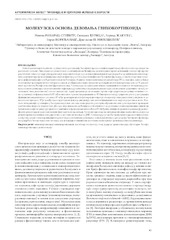Приказ основних података о документу
Molecular basis of glucocorticoid action
Молекулска основа деловања гликокортикоида
| dc.creator | Ribarac-Stepić, Nevena B. | |
| dc.creator | Đurica, Snežana N. | |
| dc.creator | Žakula, Zorica | |
| dc.creator | Korićanac, Goran | |
| dc.creator | Milošević, Dragoslav P. | |
| dc.date.accessioned | 2018-09-12T07:57:28Z | |
| dc.date.available | 2018-09-12T07:57:28Z | |
| dc.date.issued | 2005 | |
| dc.identifier.issn | 0370-8179 | |
| dc.identifier.uri | http://www.doiserbia.nb.rs/Article.aspx?ID=0370-817905061R | |
| dc.identifier.uri | https://vinar.vin.bg.ac.rs/handle/123456789/7805 | |
| dc.description.abstract | Glucocorticoid hormones are involved in regulation of cell processes and coordinate physiological response to diverse signals. These hormones, through interaction with specific intracellular receptors, coordinate components of physiological repertoires by activating the expression of gene networks. Thus hormone-receptor complexes may function as key constituent in regulation of specific cell functions as well as in provoking differentiation in already determined cells. Analysis of steroid receptors are important for understanding of molecular details of transcriptional control as well as providing the insight as to how an individual transcriptional factor such as glucocorticoid receptor, contributes to cell identity and function. The purpose of this review is to establish the general molecular mechanism of glucocorticoid action and mechanism associated hormone-receptor complexes with the control of differential patterns (i.e. "positive" and "negative") of gene expression. One of the examples of two signal pathways regulating opposite gene expression are NF-kB and GR-mediated signal pathways. These pathways have important and opposite roles in the immune function. NF-kB is transcription factor which induces the expression of many genes that participate in immune and inflamatory response, while GR is transcription factor that serves as antiinflammatory agent and immune suppressor. Their interactions within the cell, although not yet completely understood, appear to be an important, possibly even the primary mechanism of immune homeostasis. It has not been established that glucocorticoid sensitivity can be caused by mechanisms other than changes of GR number and properties, although recent studies have indicated that receptor isoforms and transcriptional factors may modulate glucocorticoid responsiveness by interacting with receptor protein or directly at the site of DNA binding. The aim of this review is also to describe the role of glucocorticoid receptors in mechanism of glucocorticoid action on cell functions, including immune responses, as well as to present emerging issues on clinical aspects of molecular mechanisms of glucocorticoid action. | en |
| dc.rights | openAccess | |
| dc.rights.uri | https://creativecommons.org/licenses/by-nc-nd/4.0/ | |
| dc.source | Srpski arhiv za celokupno lekarstvo | |
| dc.subject | glucocorticoids | en |
| dc.subject | glucocorticoid receptors | en |
| dc.subject | gene expression | en |
| dc.subject | nuclear translocation | en |
| dc.subject | target cells | en |
| dc.subject | glucocorticoid resistance | en |
| dc.title | Molecular basis of glucocorticoid action | en |
| dc.title | Молекулска основа деловања гликокортикоида | sr |
| dc.type | article | en |
| dc.rights.license | BY-NC-ND | |
| dcterms.abstract | Милошевић, Драгослав П.; Корићанац, Горан; Рибарац-Степић, Невена Б.; Ђурица, Снежана Н.; Жакула, Зорица; Molekulska osnova delovanja glikokortikoida; | |
| dc.citation.volume | 133 | |
| dc.citation.issue | Suppl. 1 | |
| dc.citation.spage | 61 | |
| dc.citation.epage | 66 | |
| dc.identifier.doi | 10.2298/SARH05S1061R | |
| dc.identifier.pmid | 16405259 | |
| dc.type.version | publishedVersion | |
| dc.identifier.scopus | 2-s2.0-33644882279 | |
| dc.identifier.fulltext | https://vinar.vin.bg.ac.rs//bitstream/id/10400/0370-817905061R.pdf |
Документи
Овај документ се појављује у следећим колекцијама
-
Radovi istraživača
Researchers' publications

